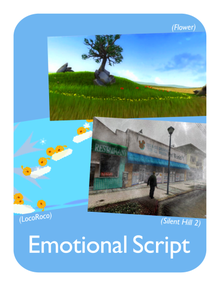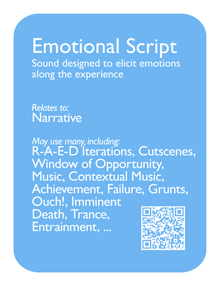Emotional Script

|

| |
| The card's front face | The card's back face |
Synopsis
| Sound designed to elicit emotions along the experience. |
Relationships
Relates to:
Narrative ![]() .
.
May use many, including:
R-A-E-D Iterations ![]() , Cutscenes
, Cutscenes ![]() , Window of Opportunity
, Window of Opportunity ![]() , Music
, Music ![]() , Contextual Music
, Contextual Music ![]() , Achievement
, Achievement ![]() , Failure
, Failure ![]() , Grunts
, Grunts ![]() , Ouch!
, Ouch! ![]() , Imminent Death
, Imminent Death ![]() , Trance
, Trance ![]() , Entrainment
, Entrainment ![]() , ....
, ....
Description
A game "experience" is built upon the memory of the emotions the player visits. In order to optimize the emotional relevance of every moment the player is interacting with the game product, an Emotional Script ought to be thoughtfully designed.
Sound holds great potential in the design of the Emotional Script. Sound can be used to portrait a certain emotional state with advantages over the visual clues (e.g. a character who laughs, or cries, or groans to indicate discomfort or fear, or verbally details a feeling). In addition to momentary emotional characterisations, sound can also be used to communicate the overall emotional development along time (e.g through the migration between distinctive acoustic moods, or through the progressive addition or subtraction of elements to the composition).
In addition to the comprehensive exploration of the emotional plane that this pattern suggests, the Deck contains other design patterns which, depending on the specific explorations, may also contribute to some of the pieces in that Emotional Script. Elicited emotions may include: satisfaction (e.g. Achievement), disappointment (e.g. Failure, Death), excitement (e.g. Engagement), amazement (e.g. Revelation), elation (e.g. Title Screens), tension (e.g. Anticipation, Engagement, Imminent Death, Hurry Up!, Window of Opportunity, Silence), serenity (e.g. Relaxation, Trance), anxiety (e.g. Silence, Noise), fear (e.g. Breath, Heartbeat), emphaty (e.g. Ouch!, Grunts, Thoughts), relieve (e.g. Decay), interest (e.g. Awareness), affection (e.g. Make Sound not War), etc.
[pending: classification inspired in EARL [REF: http://emotion-research.net/projects/humaine/earl]]
Examples
  Flower: The game propitiates a journey from the sadness of a polluted and lifeless environment to the pleasure and contentment of recovering it. This happens both at the macro level (observable for instance in the evolution of the Acoustic Ecology that accompanies the Menu) and inside each particular level where each small contribution represents and advancement in an acoustic composition, occasionally further animated by some bursts (both acoustic and visual).
|
  LocoRoco: In the example, a moment of relative affliction emphasized by the utterances of the characters involved. In general, sound design in this game is highly emotive, for each contribute aspects such as the Music, all Character's Soundprint, the way sound participates in the gameplay, the overall Aesthetics and Variety coherency in the Acoustic Ecology.
|
External Resources
[pending:References to the importance of emotions in human performance.] </br> [pending:References to lists and systems of classification of emotions.]










